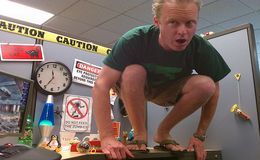
How to overcome the demands of college
Stress is a natural and inevitable occurrence in college life. But studies show that college students learn less and retain less when they’re under stress. And with ever-mounting pressure on today’s students to perform well academically, while signing on to a full slate of activities socially, stress has become a raging campus epidemic. The resulting anxiety can cause students to develop learning deficiencies, miss assignments, cut classes, underachieve or drop out altogether. So, to help you stressed out campus dwellers get your lives back under control, here are several student-centric, stress-reducing strategies, excerpted from my book “400 Ways to Stop Stress Now…and Forever!” but before you read on, remember that although college is not the time of your life when you are likely to eat healthy and get a lot of rest, if you’re stressed, those two things will help more than you can imagine.
Stay active
A key part of managing or reducing stress is taking food care of yourself. This includes partaking in regular exercise, strenuous enough to work up a sweat and to released tension that has built up. Be sure to pick something you enjoy doing that you will stick with. Take a yoga class with a friend or take up a new hobby like rock climbing. Sports, jogging and most other cardiovascular activities all can help you stay fit as well as reduce tension in your body.
Work before play
Leisure is better enjoyed with it follows a period of good work. But putting off work to have your fun first is another story. Rather than relieving stress, it can be a source of it. Because now you made a conscious decision to fall behind. And the prospect of neglected work to make up can erode your fun. don’t let others lure you away from your appointed tasks, either. Students are especially vulnerable to this. In the work/play cycle, the effort should always come first, before the reward. It just makes more sense.
Study in shorter, more frequent intervals
Study in shorter, more frequent intervals
Whether it’s schoolwork or a career training program, overnight cramming and marathon study sessions are less productive and the material more easily forgotten. Never let it get to that point. It’s better to study as you go along — in shorter, more frequent intervals. It will keep the information fresh in your mind so you won’t waste time relearning it. Review sessions will be faster and less tedious — thus, less likely to be put off. And you’ll be assured of understanding the material long after the final exam. Which is entirely the point, isn’t it? Study as you go. You’ll be able to study less and retain more.
Don’t let others waste your time
Some people have no stress empathy. They see that you’re totally crazed, yet needlessly interrupt you, get in your way, engage you in small talk and otherwise make a nuisance of themselves. These are often people you room with, or are close to, and don’t want to offend. Be polite, be diplomatic, but firmly convey the message you’re way too busy to schmooze. Seek commiseration, “You won’t believe how swamped I am.” Or look at your watch and exclaim, “Yikes! You’ll have to excuse me…” If these don’t work, simply ask them to help you with your work. That’s right. Ask for help. It will usually get rid of them, or even better, they just might pitch in.
Don’t be driven to Internet distraction
The Web can soak up precious time so insidiously you’re often not even aware of it. How easily a simple online task can end up taking an hour or more! Be smart. Devise your plan of attack before going on. And stick with it. Don’t be lured away by enticing links or allow yourself to drift about aimlessly. Log on, get what you want and get off. make the Internet the efficient, time-saving tool it was meant to be, and save your surfing for your leisure hours.
Do what needs to be done first….first
This should be automatic, but for many reasons, we’ll put off more important and pressing things to take care of lesser priorities first. Not only does it leave that bigger thing hanging over us, it often deprives us of of the time and energy we’ll need to accomplish the important task. Every day, take a few moments to consider what project would make most sense to get out of the way first. Then meet it head on, without becoming sidetracked and trying to squeeze something else in between. Then go on to the next most critical…and watch the stress ease away. It may sound difficult, but prioritizing works.














